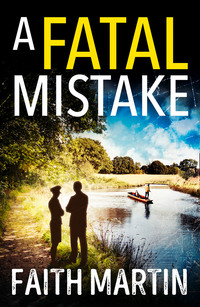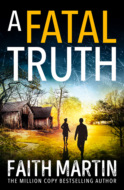Kitap dosya olarak indirilemez ancak uygulamamız üzerinden veya online olarak web sitemizden okunabilir.
Kitabı oku: «A Fatal Mistake»
About Faith Martin
FAITH MARTIN has been writing for nearly thirty years, under four different pen names, and is about to have her fiftieth novel published. She began writing romantic thrillers as Maxine Barry, but quickly turned to crime! As Joyce Cato she wrote classic-style whodunits, since she’s always admired the golden-age crime novelists. But it was when she created her fictional DI, Hillary Greene, and began writing under the name of Faith Martin, that she finally began to become more widely known. Her latest literary characters, WPC Trudy Loveday and city coroner Dr Clement Ryder, take readers back to the 1960s, and the city of Oxford. Having lived within a few miles of the city’s dreaming spires all her life (she worked for six years as a secretary at Somerville College), both the city and the countryside/wildlife often feature in her novels. Although she has never lived on a narrowboat (unlike DI Hillary Greene!), the Oxford canal, the River Cherwell, and the flora and fauna of a farming landscape have always played a big part in her life – and often sneak their way onto the pages of her books.
Readers love Faith Martin:
‘A must read for all crime fiction fans’
‘Have become an addict of Faith Martin – love her novels’
‘Cracking good read’
‘Plenty of action and drama to keep the reader gripped through to the end’
‘I would recommend this to anyone who enjoys crime fiction’
‘Compelling murder mystery’
‘Fabulous police procedural’
Also by Faith Martin
A Fatal Obsession
A Fatal Flaw
A Fatal Secret
A Fatal Mistake
FAITH MARTIN

HQ
An imprint of HarperCollinsPublishers Ltd.
1 London Bridge Street
London SE1 9GF
First published in Great Britain by HQ in 2018
Copyright © Faith Martin 2018
Faith Martin asserts the moral right to be identified as the author of this work.
A catalogue record for this book is available from the British Library.
This novel is entirely a work of fiction. The names, characters and incidents portrayed in it are the work of the author’s imagination. Any resemblance to actual persons, living or dead, events or localities is entirely coincidental.
All rights reserved under International and Pan-American Copyright Conventions. By payment of the required fees, you have been granted the non-exclusive, non-transferable right to access and read the text of this e-book on-screen. No part of this text may be reproduced, transmitted, downloaded, decompiled, reverse engineered, or stored in or introduced into any information storage and retrieval system, in any form or by any means, whether electronic or mechanical, now known or hereinafter invented, without the express written permission of HarperCollins.
E-book Edition © September 2018 ISBN: 9780008297770
Version: 2019-08-21
Table of Contents
Cover
About Faith Martin
Readers Love Faith Martin
Also by Faith Martin
Title Page
Copyright
Dedication
Chapter 1
Chapter 2
Chapter 3
Chapter 4
Chapter 5
Chapter 6
Chapter 7
Chapter 8
Chapter 9
Chapter 10
Chapter 11
Chapter 12
Chapter 13
Chapter 14
Chapter 15
Chapter 16
Chapter 17
Chapter 18
Chapter 19
Chapter 20
Chapter 21
Chapter 22
Chapter 23
Chapter 24
Chapter 25
Chapter 26
Chapter 27
Chapter 28
Acknowledgements
Coming Soon
Dear Reader
About the Publisher
For all my new Ryder and Loveday readers
Chapter 1
Summer 1960
Jimmy Roper stopped to let Tyke, his ageing but still inquisitive black-and-white mongrel, cock his leg against the wall overlooking Port Meadow. It was a glorious morning in mid-June and, overhead, the sun shone with an intensity that warned him the temperature would skyrocket come noon.
It was not the sort of day, you’d have thought, when anything bad could possibly happen.
The village of Wolvercote lay mostly behind him now, but from someone’s open window a wireless was playing the latest pop tune that all the youngsters nowadays seemed to find so enthralling. An obliging DJ told him he’d been listening to the Everly Brothers’ April hit, ‘Cathy’s Clown’.
As he approached the large expanse of Port Meadow, he paused to observe a really fine view of the legendary ‘dreaming spires’ of Oxford. In front of him, the river wound its way through the water meadow, which was just now ridding itself of its spring blaze of buttercups. Tyke happily sniffed about among the thistles.
As he approached the riverbank, he noticed that two fishermen had set themselves up for a day’s sport. One, sitting at the top of the bank with his legs dangling over the side, had on an old, floppy, wide-brimmed hat. This served not only to keep the direct sun off his head, but no doubt helped stop the garish sunlight reflecting off the water and into his eyes. It was festooned with colourful fishing flies. He had his head down and was watching his float intently. After a second or two, Jimmy also spotted it – a red spot making its way gently downstream.
His companion also wore a hat and, for added measure, was wearing a pair of large sunglasses. He’d elected to sit closer to the river’s edge, at a spot where the rather steep bank had given way, and the previous tenants (a herd of Friesian cows) had trampled down a path in order to drink. He seemed to be dozing, though, rather than watching his float, for Jimmy noticed it had been allowed to catch in a patch of river weed.
He wished them both a courteous but quiet ‘good morning’ and, not wanting to disturb the fish, walked with a lighter tread as he passed them.
He hadn’t gone much further, following the course of the river absently upstream, when he became aware of a gaggle of voices. Youthful and bantering, they sounded like something you’d hear at a party, and were thus oddly out of place in the peaceful country setting.
Rounding an oxbow in the river, he suddenly noticed a gay crowd congregating on the banks in front of him and had no problem identifying them as students, intent on enjoying the end of their exams.
Some of the young women in the group – at least twenty strong, Jimmy estimated – had already laid down gaily striped beach towels on the grass and were setting out the beginnings of a picnic. At barely eleven o’clock in the morning, Jimmy wondered whether it was supposed to be a late breakfast or a really early lunch. Then he supposed that, to these bright young things, it hardly made much difference. He noticed that strawberries, boxes of chocolates, fruit and bottles of wine featured predominantly.
Which was very nice for some, he thought, a shade enviously.
Clearly no dark thoughts could have been passing through the minds of these happy young things. They were out to enjoy their youth, the sunshine of the day, and the delights of an alfresco party. To them, death was a foreign concept, something that wouldn’t have to be considered for many decades yet.
Besides, on a day such as this what could possibly happen?
One young woman, with a mane of silvery fair hair, patted the place beside her on a towel and a young lad, who looked barely eighteen, hastened to join her.
Jimmy was pretty sure the fishermen downstream wouldn’t be best pleased by all the noise and frolicking about. Every self-respecting pike, chub, dace, roach and perch within a quarter mile must have heard them thumping about and skedaddled for quieter waters!
One or two of the young men were quickly stripping down to their bathing trunks, obviously intent on cooling off in the water.
He meandered on, smiling as one of the (rather pretty) girls shrieked as a lad scooped water over the side of the bank and splashed her. As he went past the group, however, he noticed a tall, freckle-faced man with a head of shockingly vibrant red hair, standing a little bit away and on the outskirts of the scene, watching with an expression of disdain on his face. This, and the fact that he looked to be in his mid-twenties at least – and thus a few years older than the average student – made him look out of place.
Jimmy was too intent on reaching the shade of some nearby trees to stop and pay any attention to the strangers and their doings. But as he walked on, he suddenly saw, up ahead, a plethora of disembodied heads floating along in what seemed to be the middle of the river. For a moment it brought him up short, but then, as they came better into sight, he realised they were just yet more revellers, arriving via two large punts.
Punts, he noticed with a look of mixed alarm and amusement, that looked vastly overloaded and were lying very low in the water. Surely there shouldn’t be that many of them crammed onto each craft? What was more, both of the lads who were standing on the rear platforms and wielding long punting sticks looked a little the worse for wear!
And even as he watched, the punting youth on the lead boat called out some request to one of his passengers, who was sprawling dangerously close to the waterline. Thus admonished, the very slender youth, dressed casually in white slacks and shirt, and with a head of hair so fair it was almost white, reached obligingly underneath him and produced what looked suspiciously like an open bottle of champagne, which he handed up to his friend.
The young man accepted it with a cry of triumph and casually stopped work to swig from it, tottering back a step. He would almost certainly have ended up in the river if someone else hadn’t reached out just in time to grab his trouser leg and haul him back again.
Naturally, this caused a load of heckling and good-hearted chaffing from the others, and Jimmy shook his head, not sure whether to laugh indulgently at the youthful shenanigans or to self-righteously wonder just what the world was coming to.
He finally reached the welcome shade of a line of trees that skirted the village road, and sat down on an old tree trunk. Tyke, glad to rest his old bones, gave a little grunt of satisfaction as he lay down at his master’s feet in the cool, shaded grass.
If some dogs actually did possess such a thing as an intuition for evil, or a sense of impending calamity,Tyke wasn’t troubled by such a gift.
And so, for about ten minutes, the retired milkman and his little dog simply sat there, listening to the drone of bees and watching yellow-brimstone and orange-tip butterflies flitting about the meadow. Then a quick glance at his watch told him that his wife would be getting his lunch on soon so, with a small sigh, he got up and began the return journey. If he didn’t miss his guess, it would be fish-paste sandwiches and a slice of her Madeira cake – one of his favourites.
As he retraced his route along the river towards the noisy and boisterous student party, he noticed a third punt was following a little way along behind him but paid it little attention. Instead, he gave them all a wide berth, returning to the river only when he was once again beyond the oxbow.
He wasn’t surprised, a little later on, to see that neither of the fishermen had remained in their places. He could well imagine how they must have cursed the students for selecting that spot for their revelries.
And so, Jimmy Roper and his dog went back to the village and to their midday meal, neither one of them giving the students so much as another passing thought.
Thus it was left to someone else to stumble upon the tragedy a capricious fate had always had in store for such a bright and beautiful day. Someone, perhaps, who was far less equipped to deal with the consequences of human darkness than an old soldier.
Barely an hour later, Miriam Jenks, a new mother to a rather large and placid baby girl, was pushing her pram down the village street, on her way to the village shop to order in a few necessities. Waiting on the pavement for old Dr Thomas’s ‘moggy’ Morris Minor to pass by, she decided it would be a good idea to get out of the fierce heat. So, she steered the pram onto the hard, flat, grassy path beside the riverbank to take advantage of the shade provided by the willow trees that lined the river course there. As she went along, she started to croon a tune to the baby, who had started to grizzle.
She was still humming the lullaby when something caught her eye, and she looked down to see a human body floating in the water just beside her. Having got caught up in the protruding roots of a particularly large willow, it was being moved gently about in a small eddy, one arm rolling up and down, for all the world as if it was waving at her.
But the young man with dark hair was lying facedown in the water, and she knew at once that he was dead. But even as she thought this, the current moved, and with what seemed to her to be a slow, dreadful and fascinating inevitability, the body turned inexorably onto its back.
Naturally, this made Miriam come over ‘all queer’, as she was to later tell her best friend. For a moment or two, however, she froze where she was.
But the sight of that face, pale and so pitifully and irrevocably beyond all human help, made her knees fold abruptly beneath her, and she found herself suddenly on the grass. She put out her hands to save herself, but even so, she was now much closer to the edge of the river and the body it cradled.
She noticed his clothes had ballooned, the trapped air helping to keep the boy afloat. She also noticed, fleetingly, that he seemed a good-looking lad and not much above twenty.
So young.
And so dead.
She heard a noise and realised it was coming from her. She was sobbing, softly.
For a second, the body seemed close enough for her to touch, if she reached out, down the bank and across the water – but, of course, she knew that wasn’t so. Nevertheless, she saw her hand moving forward, shaking uncontrollably in front of her as if to offer… What? her shocked brain demanded rather scornfully. Succour? Comfort? Help?
A cold voice in the back of her head told her she could provide none of these things.
She began to shiver violently, which made no sense to her. The sun was at the point in the sky when it was almost at its hottest. Even the birds had ceased singing, as if the heat had enervated them.
Feeling sick, she forced herself to her feet and began to run, pushing the pram wildly in front of her and bumping it roughly over the path. Naturally, this delightful motion promptly sent her daughter off to sleep more thoroughly than any lullaby.
She felt absurdly guilty – as if she was abandoning the dead boy when he needed her the most. She almost wanted to turn her head, to make sure he wasn’t watching her cowardly retreat with accusing, beseeching eyes.
But she had just enough sense, through the fog of shock, to realise this couldn’t possibly be so.
She was still sobbing softly when she emerged once more onto the street proper, frantically stopping the first person she saw, who happened to be an old man wheeling his wheelbarrow to the nearby allotments, and tearfully gasping out what she’d seen.
The old man promptly took her home with him, told his wife to look after her, called the police and then nipped off to the river to see the spectacle for himself.
Obviously, nothing as exciting as this had happened in the village in years!
Chapter 2
Nearly one week later, Dr Clement Ryder, a coroner of the City of Oxford, sat at his bench, listening to the court proceedings getting underway at the inquest into the death of Mr Derek Chadworth, aged twenty-one, a former student of St Bede’s College, Oxford.
At the age of fifty-seven, the coroner was a tall man, standing at an inch over six foot, with healthy, abundant white hair and somewhat watery grey eyes. And if he was just beginning to have rather more meat on his bones than in his youth, he wore the extra pounds well. The role of coroner was a second career for him after having spent the majority of his adult working life as a renowned surgeon. But not liking to dwell on the reasons for his enforced change of direction, he now watched the courtroom and its denizens with some interest. As was to be expected in a case like this, the public gallery was full, with its fair share of local reporters taking up a jockeying position. The jury, looking both sheepish and self-important, had just taken their places. A police constable waited to give his evidence rather nervously. He looked young and inexperienced, and Dr Ryder hoped he wasn’t going to have any trouble keeping him to the point.
Widely known to be a man who didn’t suffer fools gladly, he was in appearance an imposing figure, and many of the members of the public (as well as some of the court officials) watched him warily. He had the look of someone who had no problems whatsoever in juggling such weighty issues as life and death in his obviously capable hands.
He displayed no signs of outward impatience as the proceedings finally got underway. And the first of the court’s functions (to assign a name or identity to the deceased) was rapidly disposed of, as Derek’s parents had already identified his body.
Having done that, the often much trickier second question – of trying to ascertain exactly how the deceased had come to meet his end – was tackled.
First up was a nervous young mother, who gave her evidence of having seen a body floating in the river near the village of Wolvercote in a rather rushed and whispery voice. Dr Ryder, while handling her kindly, had to demand more than once that she speak up.
Next came the medical man. Dr Ryder knew him, of course – and was most certainly known by him! All those who had to give medical evidence in his court understood that no fudging would be tolerated, as it was quite clear he knew as much – if not more – about medicine as those actually giving the evidence! According to Dr Clement Ryder, at least. So it wasn’t wholly surprising that police surgeons and pathologists weren’t particularly happy when called upon to give evidence while Clement was the presiding coroner. Some of the older brigade, who naturally felt superior to both jury and coroner, and had thus become used to taking it for granted that their word would be taken for law, now refused to set foot in court if he was presiding. Of course, none of them was willing to admit that perhaps they hadn’t kept quite as up to date with all the new science and medical practices over the past decade as they should have. And they most certainly weren’t willing to concede that his own years as a surgeon gave him the right to show them up in public or drag their mistakes and uncertainties to the attention of the press.
The present medico, however, was of the younger, brasher and more confident generation of men and had no qualms about stating his opinions concerning the medical evidence uncovered in his autopsy. These opinions he proceeded to relate to the jury in no uncertain terms – including the time of death, which he stated as between 8 a.m. and 2 p.m., with a small leeway on either side.
Dr Ryder listened without interruption (a minor miracle in itself, some aficionados of the court might have said) and occasionally even nodded in approval. Mainly because the young man, without condescending or speaking down to the jury in any way, was managing in a clear and concise way to convey the facts.
The cause of death had clearly been drowning. What was more, the water found in the dead man’s lungs had been consistent with a second sample taken from the river and it was noted that there was rather a lot of sediment present, suggesting that the water the victim drowned in had been significantly churned up. Furthermore, froth at the mouth and all other signs of death by drowning had been present and meticulously noted. There were no significant signs of anything else untoward – such as a blow to the head of the type so beloved of many penny-dreadful murder-mystery books. Nor were there any scratches on his face or hands, or anything else that might indicate the young man had been in a fight or suffered any other assault upon his person.
Here, the coroner cynically noted that a number of those present seemed vastly disappointed. Evidently they had been hoping for rather more drama – especially the press men.
Unaware of this, however, the young doctor swept blithely on. He had also found alcohol present in the deceased’s stomach – not enough to state that he was very drunk, but enough to suggest he perhaps wouldn’t have been operating at his best. (Later evidence would prove the young man had been out drinking into the early hours.)
When the young doctor finally stepped down, the coroner’s brisk thanks ringing as an endorsement in his ears, Clement could see he’d made a good impression on the jury, who were now looking a little more relaxed, if not downright relieved. And it wasn’t hard to understand why.
In his two years as a coroner, Clement had come to read juries as clearly as if they were his old medical texts. No matter what the case, he’d learned all juries had certain things in common.
Nearly all of them, for instance, were anxious and aware of the burden being put on them by being called to carry out their civic duty. This was especially apparent in obvious cases of suicide, where none of them wished to add to the burden of bereaved families by labouring the point, and where, nearly always when bringing in this verdict, they included the rider ‘while the balance of their mind was disturbed’.
Sometimes they were afraid – if, for instance, the cause of death was particularly harrowing and they knew they would have to listen to horrific evidence, such as some poor farm worker being pulled into a combine harvester or something along those lines.
In the case of a suspicious death – a rare occurrence – there was always the added element of excitement and scandal that gave a particular glow to their cheeks.
Clement had seen all sorts sitting on the jury – working men, housewives, mothers, a smattering of professionals, and the occasional layabout or academic. By and large, though, they were good, honest (if not particularly intelligent), average men and women, who could be relied upon to have common sense and bring in a sound verdict. But if, by any chance, it looked as if they might be about to wander off the straight and narrow and deliver some silly verdict because they’d got a bit above themselves, or had become confused or bamboozled, it was his job to steer them back onto the right path.
Occasionally, a juror would surprise him. But he thought he had the measure of this bunch all right.
The old boy with the rumpled blue suit, for instance, was undoubtedly going to nominate himself as chairman of the committee, and would probably be backed up by the two middle-aged stalwarts from the WI, who were sitting at the far right of the line. A younger woman and two younger men were clearly impatient and wanted only to get it all over with. No doubt they felt they had better things to do. A rather vacant-eyed middle-aged man was actually taking it all in keenly, which was more than could be said for an old woman who was busily knitting something surreptitiously on her lap. As for the rest, they were the usual mix and match to be found anywhere in British society.
After the medical man came one of the boy’s tutors, who maintained he’d been a steady, reliable sort of chap, and would almost certainly have passed his exams with a good upper second. As far as he knew, Derek Chadworth had no money worries, or girl trouble, and the last time he’d seen him he had been as bright and breezy as ever. In other words, Clement thought, eyeing the witness indulgently, he was making it clear that the boy had no reason whatsoever to go about chucking himself in the river and thus making such a nuisance of himself.
It went down well with the jury, who could now relax even further, since the nasty little spectre of suicide seemed less likely.
Next up came the boy’s parents, his tearful mother making everyone feel sympathetic and uncomfortable in equal measure. She too stated that her son’s last letter home had been cheerful, and full of what he intended to do once he’d matriculated. When asked by the coroner, she said her son could swim a bit, after a fashion, but that he wasn’t what you’d call ‘particularly at home in the water’.
So far, Clement thought, keeping a careful eye on the clock (since one of his remits was to keep the schedule ticking along nicely and make sure things didn’t overrun – otherwise his officers tended to get restless), it was all shaping up to be either misadventure or death by accidental drowning.
He expected it to be all over bar the shouting by four o’clock. Which would suit him fine. He was rather looking forward to a round of golf before it got too dark. And he thought if he could find old Maurice Biggleswade at the eighteenth hole, he might win a guinea from him in a bet as to who could get a birdie.
However, as luck would have it, the next few witnesses began to make him sit up and pay closer attention.
First up was the police report. Delivered by a young PC, his evidence was simple enough on the face of it. They had established that, on the day in question, up to fifty or more students had congregated on the banks of the river in Port Meadow to hold an impromptu picnic party in celebration of the end of exams for most of them. This party comprised three separate contingents. First, a group of fifteen or so students had arrived at the banks of the river via bus or motorcar. These had consisted largely of young women and a few young men, who had brought food, towels, bathing dresses and such. A second group had arranged to meet them via punt and had hired two such vessels from nearby Magdalen Bridge, setting off down the river at around 9.30 a.m. However, a third party of students, who had also rented a punt, had just happened to meet up with them and accidentally collided with the other two punts, tipping a large number of students into the river.
A few dry words of query from Clement quickly established that most witnesses, when questioned early on that afternoon (once the body of Derek Chadworth had been pulled out of the river a little downstream), had been clearly rather the worse for drink.
Indeed, the PC admitted with a deadpan face, most of the students had admitted to being a ‘bit squiffy’ on orange juice and champagne, supplied by Lord Jeremy Littlejohn in his rooms in college, even before setting off to hire the punts. And that, on the journey towards Port Meadow, beer and yet more champagne had been quaffed liberally.
Lord Littlejohn, it became clear, was the sun around whom most of the other students orbited, the leading light in student society, and it simply didn’t do to disappoint him, or otherwise incur his laconic displeasure. Not if you wanted to be in with the ‘in’ crowd, anyway!
About half the partygoers had elected to stay ‘larking about’ on the punts while half had disrobed and swum to shore by the time the third punt arrived and the collision took place.
When asked what the immediate result had been when all three punts collided, tipping the majority of passengers into the river, most students agreed that everyone thought it was ‘screamingly funny’ and ‘a bit of a jape’. Nearly everyone from the original two punts had clambered up and onto the banks, for the river was hardly wide at that point. They then proceeded to strip off all they decently could (and perhaps not so decently in some cases, the constable muttered darkly) in the hope that the hot sun would quickly dry their clothes – and themselves – off.
All those from the third punt, however, had elected to climb back onto their vessel and – amidst much ribald argument over who had caused the accident – head back to Oxford the same way they’d come.
All those questioned were adamant they had heard no calls for help, nor seen anyone in obvious difficulty in the water.
Having given his evidence, the PC left the stand with obvious relief.
Obviously, not every student present at the party had been called to give testimony – only a small cross-section. But it was when these students were called to give more specific evidence that Clement Ryder first began to smell a rat.
First off, one Rt Hon Lady ‘Millie’ Dreyfuss was called to the stand. A third-year English literature student from Cadwallader College, she stated clearly that, although she hadn’t known Derek Chadworth, she was sure he couldn’t have been part of the picnic party. She had been in charge of laying on the food and making the travel arrangements, and had delegated some of these chores to three other girls, who’d brought along their boyfriends to help. But they hadn’t offered the dead boy a lift in their cars, nor had he been one of the small group of students who’d caught the town bus.
Ücretsiz ön izlemeyi tamamladınız.






